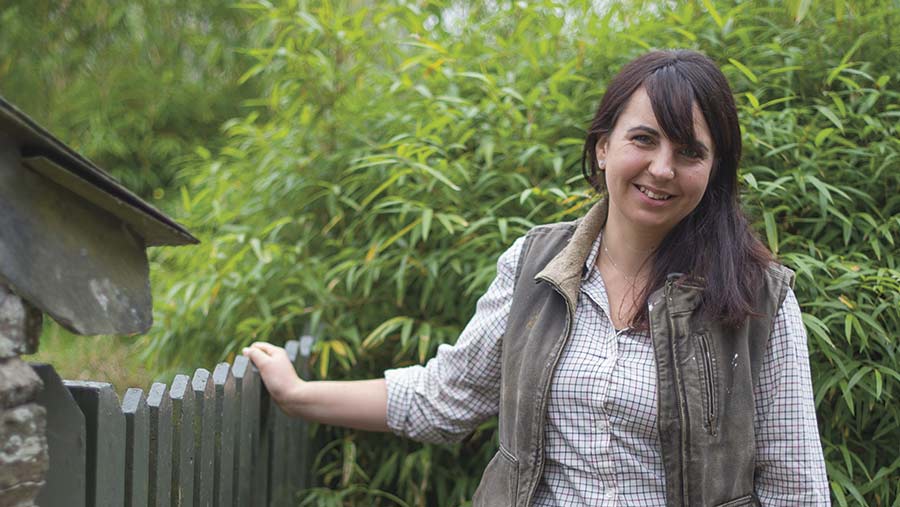Opinion: This year I will Brexit-proof my farm
 Jess Jeans © Jim Wileman
Jess Jeans © Jim Wileman January is generally thought of as the most miserable month of the year. The days are short, the weather is terrible and summer seems so far away.
But for me, January is one of my favourite times of year – not least because it’s when my birthday falls.
It is a time for renewal, making plans, sweeping away the cobwebs from the last year and looking forward to the future with optimism.
See also: Santa, please bring BPS cash and install the Rayburn
I try to avoid the “new year, new you” stereotypes, but it is a time when I try to make positive changes on the farm and in my personal life.
Last year was a tumultuous one and I doubt we have seen the last of the political and economic earthquakes yet.
With the orange glow of President Trump looming over global politics and our own government still trying to work up the courage to send off the EU divorce papers, we are a long way from knowing what the plan for British agriculture outside the EU is going to be.
Lots of people are starting to crawl out of the woodwork to say they have changed their minds and are asking if I think I got it wrong too. My answer to that is of course not.
Leave vote chaos
I said long before I cast my ballot that there would be political chaos in the wake of a leave vote and that is exactly what we are seeing now.
The world has never been in this situation before, whereby the masses have voted for a change that the power wielders neither expected nor had a plan for.
The EU has no idea how to deal with the UK outside its borders. Our economies are intrinsically linked, our cultures overlap and our people cross the Channel back and forth like the seabirds.
Until we start the formal process of leaving, a lot of what we are hearing in the media is all hot air and I personally don’t have time to get worked up about it yet.
I know that farming is going to be relatively low on the agenda and the risks of tariffs being imposed on key UK agricultural products such as lamb are significant.
Brexit-proof farm
However, looking out of the kitchen window, I noticed something I consider rather important: the land is still there – the trees, fields, wildlife and livestock aren’t going anywhere, and neither are we.
My plan is to Brexit-proof my farm from the inside out – identify the major risks and opportunities as they present themselves and be prepared to adapt our farming system to cope with what Brexit throws at us.
I understand that the prospect of uncertainty over the industry in the next few years is going to present major problems and potentially financial difficulties for some farmers. I’m not immune to the risks – our business is going to have to seriously pull up its socks if we are going to thrive.
As a first-generation tenant farmer, I am particularly exposed to market volatility and without any land or property assets, it is very hard to secure borrowing for investment and impossible to release capital to prop up our business in lean times.
Reduce reliance on subsidies
A key goal for our business is to reduce our reliance on direct farming subsidies. Like many small family farms, the BPS is critical for propping up our business. Without it, the farm would be financially unsustainable. That needs to change fast.
I’m fairly certain there will be some form of state funding for farmers, but I hope the end of direct subsidies is in sight. I want to be paid for the things my farm provides that I can’t sell.
The natural environment is one of our country’s most precious resources and as a farmer I care deeply about protecting and enhancing it, but I need the cash to do that properly.
Invest in technology
As a smaller-scale farmer, I want to be able to invest in technology and infrastructure that can make me competitive with larger farms and able to cope with global market volatility.
I need to be able to match larger farms in terms of efficiency and marry that with delivering positive environmental outcomes. Achieving this and providing a good standard of living for my family is a massive task.
Brexit is bigger than all of us and it is daunting to know we will have so little say in the negotiations that will shape our future, but January is the month of optimism and our success will be decided not in Brussels or Whitehall, but on our own farmyards.
By using the resilience and perseverance that is built into our rural culture, we will emerge stronger from this time of uncertainty – so sit back and enjoy the circus while it lasts.
Jess Jeans and her husband Will run 75 suckler cows on an 80ha National Trust farm on the Devon/Cornwall border. They have two children, Teddy and Lydia. Jess has a degree in rural business management and enjoys horse riding in her spare time
